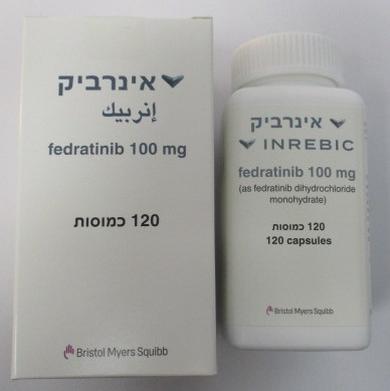Quest for the right Drug

אינרביק INREBIC (FEDRATINIB AS DIHYDROCHLORIDE MONOHYDRATE)
תרופה במרשם
תרופה בסל
נרקוטיקה
ציטוטוקסיקה
צורת מתן:
פומי : PER OS
צורת מינון:
קפסולות : CAPSULES
עלון לרופא
מינוניםPosology התוויות
Indications תופעות לוואי
Adverse reactions התוויות נגד
Contraindications אינטראקציות
Interactions מינון יתר
Overdose הריון/הנקה
Pregnancy & Lactation אוכלוסיות מיוחדות
Special populations תכונות פרמקולוגיות
Pharmacological properties מידע רוקחי
Pharmaceutical particulars אזהרת שימוש
Special Warning עלון לרופא
Physicians Leaflet
Posology : מינונים
2 DOSAGE AND ADMINISTRATION 2.1 Recommended Dosage Conduct baseline testing of thiamine (Vitamin B1) levels prior to initiation of INREBIC [see Dosage and Administration (2.2), Warnings and Precautions (5.1)]. The recommended dosage of INREBIC is 400 mg taken orally once daily for patients with a baseline platelet count of greater than or equal to 50 x 109/L. INREBIC may be taken with or without food. Administration with a high fat meal may reduce the incidence of nausea and vomiting. The capsules should not be opened, broken or chewed. They should be swallowed whole, preferably with water. Modify the dose for patients using concomitant strong CYP3A4 inhibitors, and in patients with severe renal impairment (creatinine clearance (CLcr) 15 mL/min to 29 mL/min) [see Dosage and Administration (2.3, 2.4)]. If a dose of INREBIC is missed, the next scheduled dose should be taken the following day. Patients that are on treatment with ruxolitinib before the initiation of INREBIC must taper and discontinue according to the ruxolitinib prescribing information. 2.2 Monitoring for Safety Obtain the following blood tests prior to starting treatment with INREBIC, periodically during treatment, and as clinically indicated [see Warnings and Precautions (5.1, 5.2, 5.4, 5.5)]: • Thiamine (Vitamin B1) level • Complete blood count with platelets • Creatinine and BUN • Hepatic panel • Amylase and lipase 2.3 Dose Modifications with Concomitant Use of Strong CYP3A4 Inhibitors Reduce INREBIC dose when administering with strong CYP3A4 inhibitors to 200 mg once daily. In cases where coadministration with a strong CYP3A4 inhibitor is discontinued, INREBIC dosage should be increased to 300 mg once daily during the first two weeks after discontinuation of the CYP3A4 inhibitor, and then to 400 mg once daily thereafter as tolerated [see Drug Interactions (7.1)]. 2.4 Dose Modifications for Severe Renal Impairment Reduce INREBIC dose to 200 mg once daily in patients with severe renal impairment (creatinine clearance (CLcr) 15 mL/min to 29 mL/min as estimated by Cockcroft-Gault (C-G) equation). 2.5 Dose Modifications for Adverse Reactions Modify dose for hematologic and nonhematologic adverse reactions per Table 1 and Table 2. Discontinue INREBIC in patients unable to tolerate a dose of 200 mg daily. See Warnings and Precautions for other mitigating strategies. Table 1: Dose Modifications for Hematologic Adverse Reactions Hematologic Adverse Reactions Dose Reduction Grade 4 Thrombocytopenia or Interrupt dose until resolved to Grade 2 or lower or baseline. Restart dose at 100 mg daily below the last Grade 3 Thrombocytopenia with active bleeding given dose. Interrupt dose until resolved to Grade 2 or lower or Grade 4 Neutropenia baseline. Restart dose at 100 mg daily below the last given dose. Consider dose reductions for patients who become transfusion-dependent during treatment with INREBIC. Table 2: Dose Reductions for Nonhematologic Adverse Reactions Nonhematologic Adverse Reactions Dose Reduction Interrupt dose until resolved to Grade 1 or lower or Grade 3 or higher Nausea, Vomiting, or Diarrhea not baseline. Restart dose at 100 mg daily below the last responding to supportive measures within 48 hours given dose. Nonhematologic Adverse Reactions Dose Reduction Interrupt dose until resolved to Grade 1 or lower or baseline. Restart dose at 100 mg daily below the last given dose. Grade 3 or higher ALT, AST, or Bilirubin Monitor ALT, AST, and bilirubin (total and direct) more frequently following the dose reduction. If reoccurrence of a Grade 3 or higher elevation, discontinue treatment with INREBIC. Interrupt dose until resolved to Grade 1 or lower or Grade 3 or higher Other Nonhematologic Toxicities baseline. Restart dose at 100 mg daily below the last given dose. 2.6 Management of Thiamine Levels and Wernicke’s Encephalopathy (WE) Assess thiamine levels and nutritional status prior to starting INREBIC and periodically during treatment and as clinically indicated. Do not start INREBIC in patients with thiamine deficiency; replete thiamine prior to treatment initiation and during treatment if thiamine levels are low. If Wernicke’s encephalopathy is suspected, immediately discontinue treatment with INREBIC and initiate parenteral thiamine treatment. Monitor until symptoms resolve or improve and thiamine levels normalize [see Warnings and Precautions (5.1) and Adverse Reactions (6.1)].

פרטי מסגרת הכללה בסל
א. התרופה תינתן לטיפול במיאלופיברוזיס בדרגת סיכון intermediate 2 או high לפי IPSS על רקע:1. מיאלופיברוזיס ראשונית;2. פוליציתמיה ורה;3. essential thrombocythemia.ב. התרופה תינתן לחולים שטרם טופלו במעכב JAK למחלתם.
שימוש לפי פנקס קופ''ח כללית 1994
לא צוין
תאריך הכללה מקורי בסל
01/03/2021
הגבלות
תרופה מוגבלת לרישום ע'י רופא מומחה או הגבלה אחרת
רישום
168 28 36598 99
מחיר
0 ₪
מידע נוסף
עלון מידע לצרכן
23.02.22 - עלון לצרכן אנגלית 23.02.22 - עלון לצרכן עברית 23.02.22 - עלון לצרכן ערבית 22.09.23 - עלון לצרכן עברית 11.10.23 - עלון לצרכן אנגלית 11.10.23 - עלון לצרכן עברית 11.10.23 - עלון לצרכן ערבית 28.03.24 - עלון לצרכן עברית 03.04.24 - עלון לצרכן אנגלית 03.04.24 - עלון לצרכן עברית 03.04.24 - עלון לצרכן ערבית 05.01.22 - החמרה לעלון 23.02.22 - החמרה לעלון 08.08.23 - החמרה לעלוןלתרופה במאגר משרד הבריאות
אינרביק